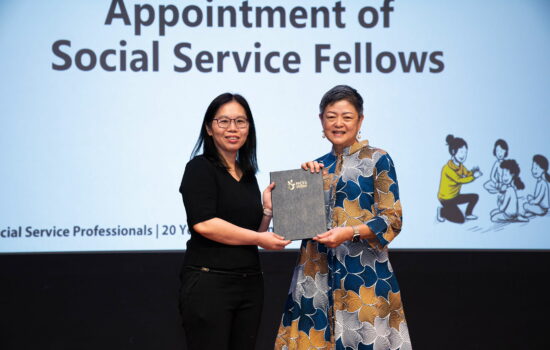This Autism Awareness Month, we celebrate the abilities and aspirations of some of our clients on the spectrum, as well as honour the contributions made by the team supporting them.
Paving Way for a Brighter Future

Years of working with autistic clients have given occupational therapist Genevieve Ng a glimpse into their lives. She recalled an incident at a former workplace when a student ran out of school and unintentionally injured a teacher while being restrained. It was only later that they found out that he was chasing after his mother’s car to retrieve a Teacher’s Day gift that he had left behind.
“When he was stopped by the teacher, he was already panicking and was unable to explain the situation. What appeared to be inappropriate behaviour stems from the student’s desire to express gratitude to his teacher,” she recalled.
Bystanders may often be quick to judge when they see an autistic individual having a meltdown or displaying inappropriate behaviour in public. “I hope that society will give them a chance to be understood, by simply interacting and getting to know them and their condition,” she added.
As part of the transdisciplinary team at SPD’s Early Intervention Programme for Infants and Children (EIPIC), Genevieve works closely with caregivers and professionals from various disciplines to help children maximise their participation and independence in daily life.
“We do this by identifying the child’s interests and strengths, concerns affecting their participation in class routines as well as parents’ priorities. Then we would develop functional goals for each child and provide interventions in classroom settings and routines such as art, snack time, arrival and dismissal routines to meet the goals set and improve their participation in class,” she said.

When working with autistic children, EIPIC teacher Marieta Furtado shared that providing visual support such as pictures and visual steps can help them to learn better. Speaking in simple and clear sentences also helps these children to understand instructions more easily.

Five-year-old Aaqil Zidan is one of Genevieve and Marieta’s clients at SPD@Tampines, who learns better through visuals. As a result, his mother Mdm Siti Jamaliah finds it effective to write down instructions and get Zidan to rewrite them while reading out loud.
The young boy, who enjoys learning languages and reciting the multiplication table, is currently picking up the Greek language through YouTube videos. “My hope for Zidan is for him to be more independent and confident, as well as to be more socially interactive with his peers,” shared Mdm Siti.
Vocational Training to Engage Clients Gainfully

There has never been a boring day at work for Edward Gunalan (left in photo) since he stepped foot in SPD’s Sheltered Workshop as a workshop supervisor about two and a half years ago. Many of the autistic clients continue to surprise Edward in the best way possible, including one who has the amazing ability to tell the day of the week of any date.
“Every client at the Sheltered Workshop has a goal of being a gainfully engaged and productive member of society. Part of my role is to find ways to break down tasks by carving out parts of jobs and assigning them according to each client’s strengths. I also provide individualised support such as visual aids, schedules, and step-by-step instructions to help clients complete the tasks and have a fair shot at attaining their personal goals,” he explained.

Advocating on behalf of the clients as they navigate the challenges of finding their place in society is something Edward values.
“Some of my clients face challenges that are not apparent to the casual observer. These may present in many ways from an inability to follow verbal instructions, or a reluctance to take on more than one task a day, to not knowing when or how to ask for help. This often leads to misunderstandings and frustrations for both the clients and supervisor. The key is to take time to understand the clients and their needs, and provide them with appropriate supports to allow them to be the best version of themselves,” he added.
Above all, Edward hopes his clients will enjoy a life that is filled with opportunities, while being engaged in things that allow them to lead dignified and fulfilling lives.
Meaningful Engagement of Clients, Respite for Caregivers

Ten years and six months is how long Thamaraivalli Narayanan (Valli) has been a training officer at SPD’s Day Activity Centre (DAC). Engaging clients meaningfully through a structured routine of activities, while providing respite to the caregivers, is part of her day-to-day work.
From working with mostly clients with physical disabilities in the early days, Valli has since moved to support autistic clients when the DAC opened its autism wing in 2018. To Valli, working with autistic clients poses different challenges as they have different sensory processing issues and learning challenges. For instance, they may stick to a schedule as they tend to do best with a highly structured routine.
As there are some autistic clients who need a higher level of support, being non-judgmental and keeping an open mind are two important traits required to manage the challenges that may arise, she said.
“When clients experience mood swings, I try not to take it personally and manage the challenges accordingly. Patience and understanding are also important as it is difficult for autistic clients to express their likes and dislikes,” she added.
Seeing clients being able to learn new skills and becoming more independent is heartening for Valli.

One of the clients whom Valli supports is 22-year-old Gek Teng. Always happy to turn up at the DAC, Gek Teng likes following a schedule to a T when it comes to performing tasks and activities. She enjoys physical activities and actively participates in the exercise regime at SPD. More recently, she has also been learning new craft work under the guidance of our training officers and occupational therapists.
More than ten years on, it is still the warmth and cheerful nature of her clients that keeps Valli going: “Their gestures to express affection stay etched in my mind and they are what drive me to work every day.”
A Call to Inculcate Inclusivity From Young

For 25-year-old Tan Jun Long, this is a year of learning and trying out new things. Among his “discovery” list is to learn more about buses and trains and how they function. The Microsoft YouthSpark scholar also hopes to upskill by taking more certified courses in Microsoft Learn, after attending the Microsoft APAC Enabled Program.
Currently in his fourth year of studies in Computer Science at Nanyang Technological University, Jun Long has come a long way in terms of interacting with his peers.
“During my primary and secondary school days, I struggled to make friends because of my disability. That was the time when I felt excluded and often felt lonely. This may be because people generally do not know much about disabilities and how they affect our lives,” he recounted. He was diagnosed with autism spectrum disorder when he was four.
While his interaction with others has improved over the years with the help of his counsellors, teachers and loved ones, he hopes to see more awareness raised in schools to help students understand different disabilities.
Regardless of disabilities or circumstances, Jun Long urged fellow students to create a supportive network to help each other grow: “All of us will experience struggles in our lives, be it financial or family issues. Therefore, we should play our part to encourage one another to grow regardless of our backgrounds.”
The spark that starts a friendship often begins with just a simple smile or an open mind. May we all continue to extend our friendship and include our autistic peers and other persons with disabilities in the community.





